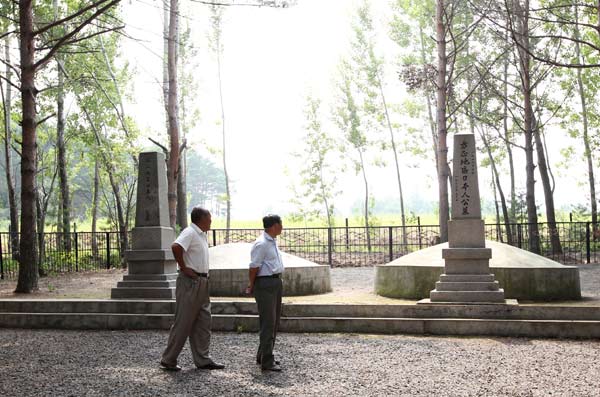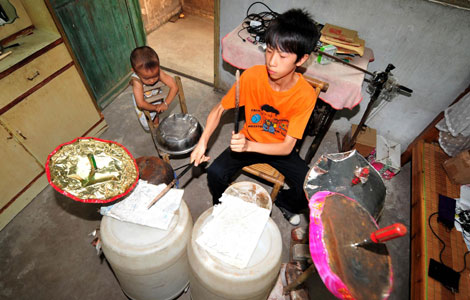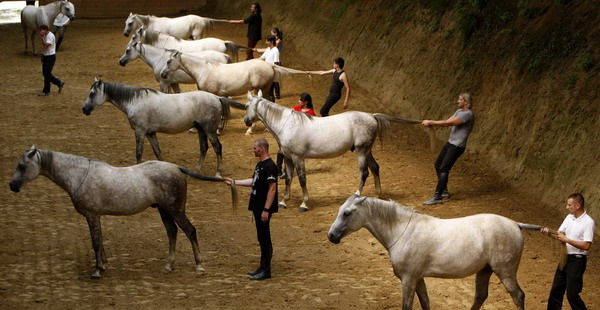Public anger brings down memorial
Updated: 2011-08-08 08:19
By An Baijie and Tian Xuefei (China Daily)
|
|||||||||||
|
 |
|
A memorial for Japanese citizens who emigrated to Northeast China from 1932 to 1945 during the Japanese occupation was torn down in Heilongjiang province, on Friday night. The memorial, demolished before the picture was taken, stood between the two tombstones. [Provided to China Daily] |
HARBIN - The government of Fangzheng county in Northeast China's Heilongjiang province has demolished a small memorial wall to Japanese immigrants, which it built last month, in an effort to appease public anger, local authorities confirmed on Sunday.
The Fangzheng county government built the wall, which was 6.9-meters wide and 3.8-meters high, at a cost of 500,000 yuan ($77,000). It was set up as a memorial site for more than 5,000 Japanese immigrants who stayed and died in the county after the Japanese army surrendered in 1945.
From 1932 to 1945, the Japanese government sent more than 200,000 emigrants, including lots of ex-servicemen, to Northeast China, which was then under Japanese rule. The Japanese government planned to settle 5 million of its citizens in China to establish colonies after the Japanese invasion. About 35 million Chinese were killed or wounded in the war.
An official from the publicity department of Harbin, capital city of Heilongjiang province, on Sunday told China Daily on condition of anonymity that the wall, which bore the names of 229 Japanese immigrants, was demolished by the local government on Friday night.
"The decision was made by the Harbin city government and was carried out by the county government," said the official.
A pile of cement lumps and bricks was visible on Saturday morning at the site. Nearly 40 security guards and policemen were on duty there on Saturday. They remained silent when asked by visitors about the demolition of the wall, according to the Beijing-based Mirror Evening News.
Yu Fenghua, deputy head of the county's publicity department, told China Daily on Sunday that the latest information from the local government was on its micro blog at weibo.com, a website run by news portal sina.com.cn.
The latest entry on the local government's micro blog, which was posted on Saturday morning, admitted that the construction of the memorial wall had raised public concern.
"Many people disapproved of it, and someone damaged the wall," said the micro-blog entry. "As a result, the department concerned decided to close the garden temporarily and tackle (the problem of) the wall's name."
Previously it was said online that the county's Party chief Liu Jun was removed from the post after the wall aroused public anger. The authority confirmed to China Daily that it was only rumor.
Bai Yansong, a renowned anchor on China Central Television, commented that the influx of paramilitary immigrants during the war was a method of incursion that was "more terrible than armed intrusion".
The closure of the wall came two days after five angry Chinese men attacked it.
On Wednesday, five men, aged 24 to 35, came to the county from Hunan, Hebei and Henan provinces. They splashed red paint on the wall after their efforts to destroy it with hammers failed. Police seized the men on the spot and released them that evening.
Chen Fule, the organizer of the attack, told China Daily on Sunday that the demolition of the wall was not the end of the issue, and that the local government must apologize to the public for erecting such a wall.
"I am glad that our goal of demolishing the memorial wall has been achieved," Chen said. "The local government should tell the public which official proposed such a silly idea of establishing a memorial wall for invaders, and it should apologize for misusing 500,000 yuan of taxpayers' money."
Chen said that although the attack on the wall was not the best choice, it proved effective in urging the local government to demolish it.
"There were news reports in late July that condemned the building of the wall, but the local government just ignored the public's request to destroy it," Chen said. "Two days after we went there and attacked the wall, it was demolished, which shows the effectiveness of our acts."
Chen also suggested that instead of setting up a memorial wall for Japanese invaders, the local government should build memorials for the Chinese fighters who lost their lives in the War of Resistance against Japanese Aggression.
Chen's suggestion was echoed by Li Min, an 88-year-old veteran who fought against Japanese troops in Northeast China during World War II. Li said the history of resistance to the Japanese invasion should be remembered.
"It reflects how ignorant the local government was about history," Li told China Daily. "The history of Japanese paramilitary immigrants should be written into the history textbooks to avoid the reappearance of such incidents in the future."
Zhou Huiying contributed to this story.
Hot Topics
Anti-Gay, Giant Panda, Subway, High Speed Train, Coal Mine, High Temperature, Rainstorm, Sino-US, Oil Spill, Zhu Min
Editor's Picks

|

|

|

|

|

|







